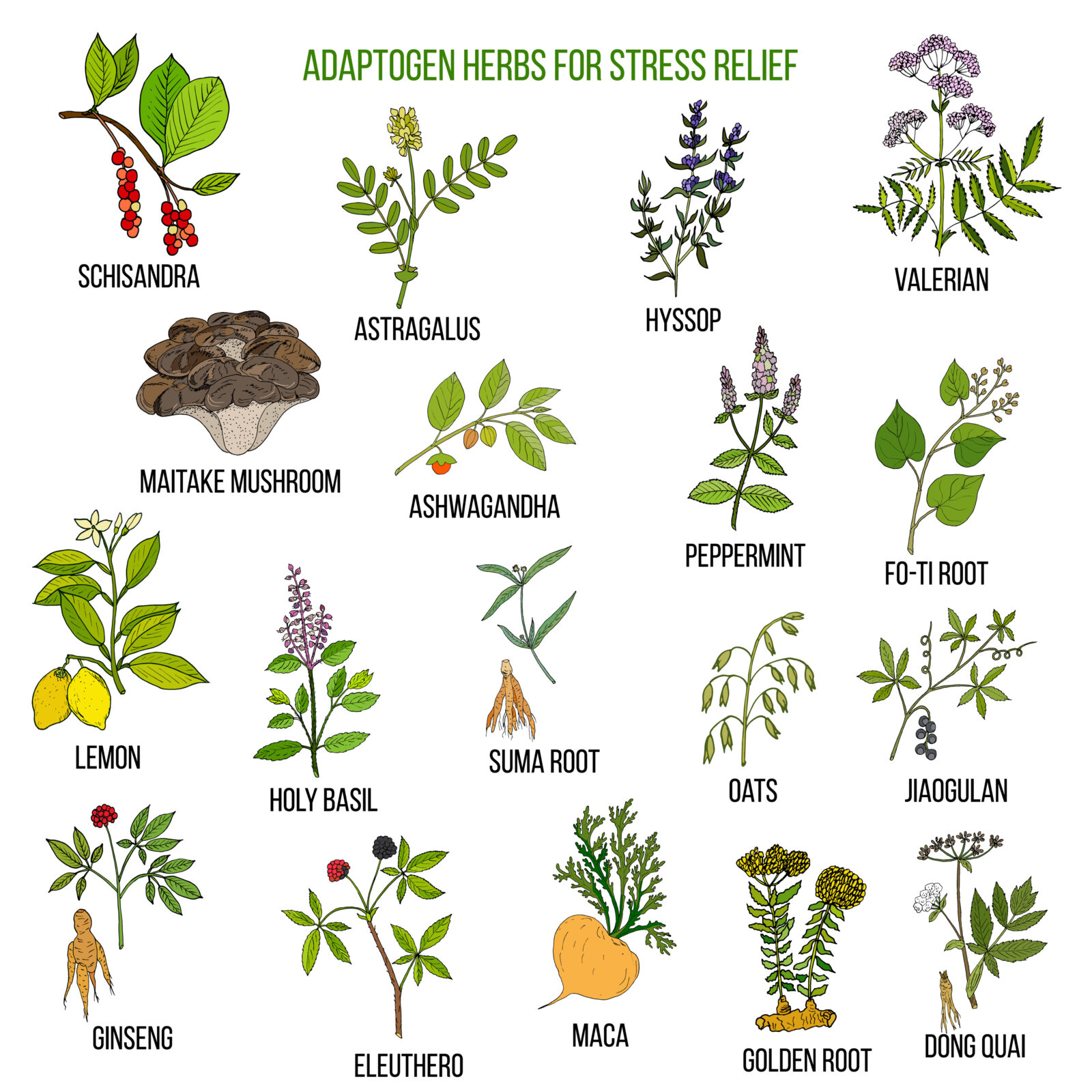Adaptogens and Tea: A Perfect Pair
Roots and rhizomes, leaves and fungi — we use them when we cook, we brew them in teas, and we encounter their names on the labels of supplements brands. And some of them, too, fall within a unique category of botanical: adaptogen.
First officially recognized in 1947 in the former Soviet Union, adaptogens today are widely recognized as plants with compounds that help the human body adapt to stress. The name, beginning with the word “adapt,” captures the wellness essence of these magnificent plants.
People around the world, but especially in Asia, have engaged with some of these plants, such as the root ginseng, for thousands of years. But they only entered the mainstream in the United States during the past decade. And now, they are attracting buzz: Google Trends reports that during the past five years, searches for adaptogens reached their height during the first two months of 2023.
Some of them, like ginseng and maca root, may boost energy. Others, like ashwagandha, are better known for sparking relaxation. They come in many forms, including tinctures, pills and powders. Fortunately, they also offer unique flavors and provide their wellness benefits when brewed into tea. We offer a range of teas that incorporate adaptogens.
What are some different adaptogens?
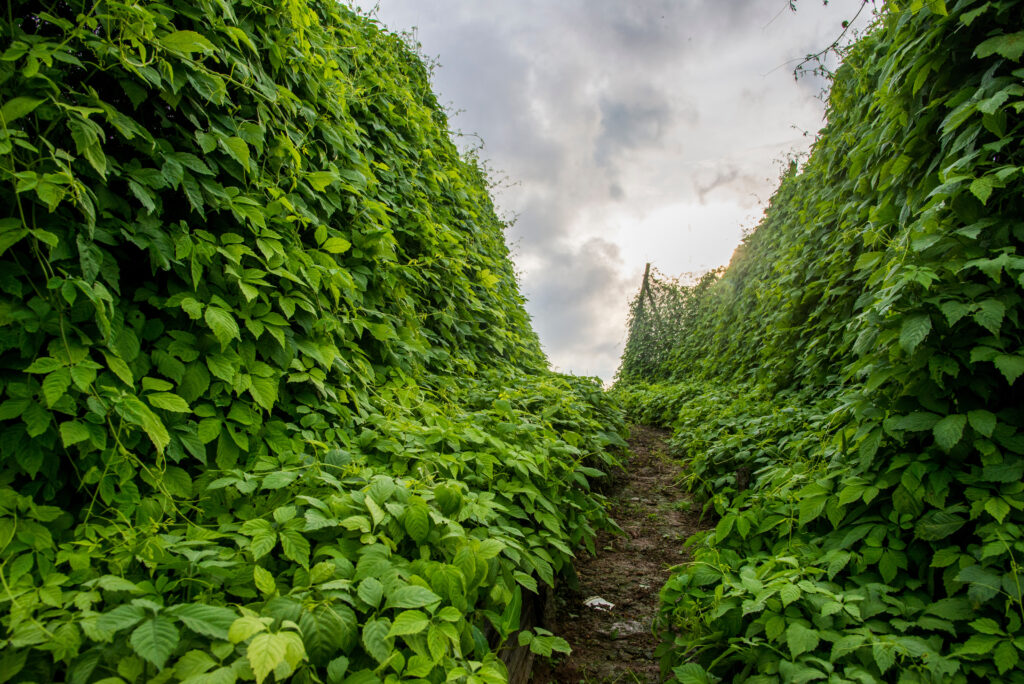
It is not known how many plants contain botanicals with adaptogenic qualities. But thankfully, we already enjoy a robust list of them, which includes:
- Ashwagandha, a root that offers benefits for stress management, mood, immune function and memory
- Rhodiola, a plant leveraged for mental performance, concentration, stress and more.
- Turmeric, a spice with a key ingredient, curcumin, which ratchets back levels of cortisol and soothes inflammation
- Reishi, a mushroom that people take to boost immunity, promote longevity and more.
- Licorice, a root popular for optimizing digestion and respiratory function, while also managing stress.
- Tulsi, a plant widely used to promote well-being and bolster resilience.
How do adaptogens work?
Researchers believe that adaptogens support the body’s hypothalamic-pituitary-adrenal (HPA) axis, a term that simply refers to interactions between the hypothalamus, pituitary gland and adrenal glands. The HPA matters: it controls the body’s response to stress. And research suggests that adaptogens help balance the HPA axis, and thus promote healthy stress responses.
Adaptogens at Ku Cha House of Tea

Most of our teas with adaptogens include them as constituent parts of blends, with one exception: our jiaogulan tea. People in China have been enjoying this vining plant, also known as “Southern ginseng” and a relative of the cucumber, for thousands of years for energy. People embrace for its energy-boosting properties, along with how they find it useful for managing anxiety, cholesterol and even diabetes.
We sell jiaogulan by itself, and as part of our Immortal Tea blend. Other adaptogens that we leverage are turmeric, licorice and tulsi. Read on for details about three teas containing adaptogens that we think you’ll love.
Adaptogens and Tea: Beauty Tea (Tulsi)
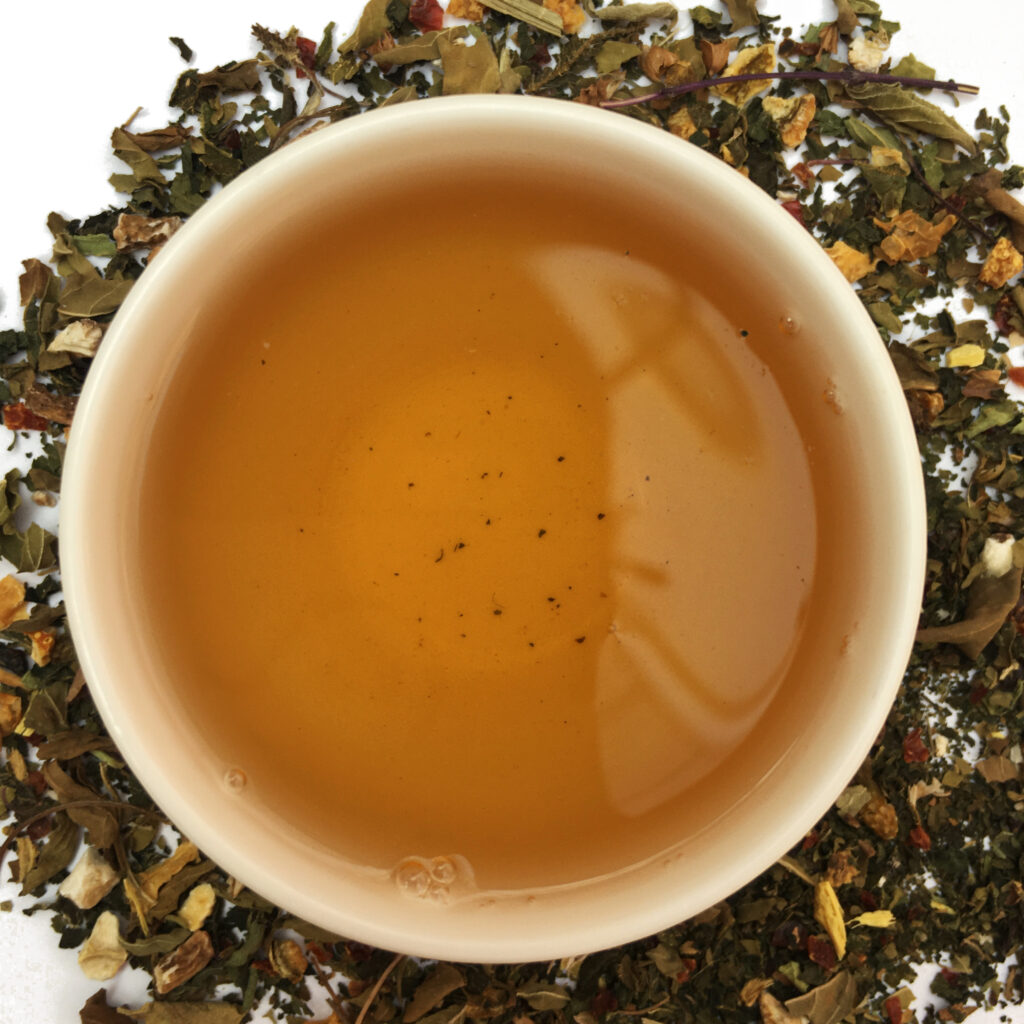
This lovely tea contains two adaptogens, tulsi and licorice, in a caffeine-free blend that aims to promote hair, skin and nails health. Rich in A, C, E and B-complex vitamins, Beauty Tea strengthens the keratin found in hair and nails, while simultaneously battling acne and keeping skin elastic and nourished.
Tulsi, one of the adaptogens, is also known as “Holy Basil,” and revered across India, where it is used by Ayurvedic medical practitioners to deal with a variety of conditions, including infections, skin diseases, colds and more. Tulsi is a champion plant: flooded with powerful botanicals, highly flavorful and versatile: with its slight anise notes, tulsi plays nice with nearly all other flavors.
The other Beauty Tea adaptogen, licorice root, is well-known among naturopathic physicians for its abilities to improve digestion and alleviate throat discomfort. But relatively few people realize that licorice is also an adaptogen, one that can help people navigate and diminish symptoms of stress.
The blend also contains nettle, rose hip and orange, for a delicious flavor and additional wellness benefits.
Adaptogens and Tea: Immortal Tea (Ginseng and Jiaogulan)
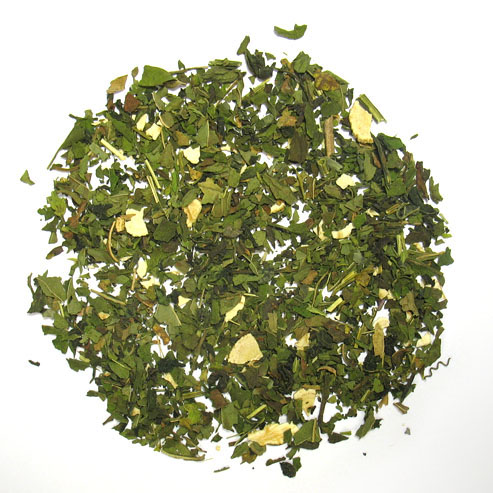
We have already discussed Jiaogulan, which is also known as “Immortality herb” in China, and are thrilled to offer it in this superb blend, as well as on its own as a single-herb tea. In addition to jiagoulan and its stimulating properties, Immortal Tea includes ginseng, which is the OG adaptogen in terms of its resonance in popular culture. Anybody who visited an Asian grocery store at any point during the past 30 years or more has probably come across ginseng teas, tinctures and a counter, behind which the store holds its whole ginseng roots, often preserved in an amber liquid.
Ginseng is famously stimulating. We savor its rich flavor, with its strong herbal notes wreathed in hints of anise, and drink it across mornings and afternoons. We steer clear of it, though, in the evening. Ginseng’s energy is nothing like caffeine; it doesn’t make the mind race. In fact, we find it nurtures balance. But nevertheless, it might keep you awake if it’s consumed close to bedtime.
Adaptogens and Tea: Sunrise Chai (Turmeric)
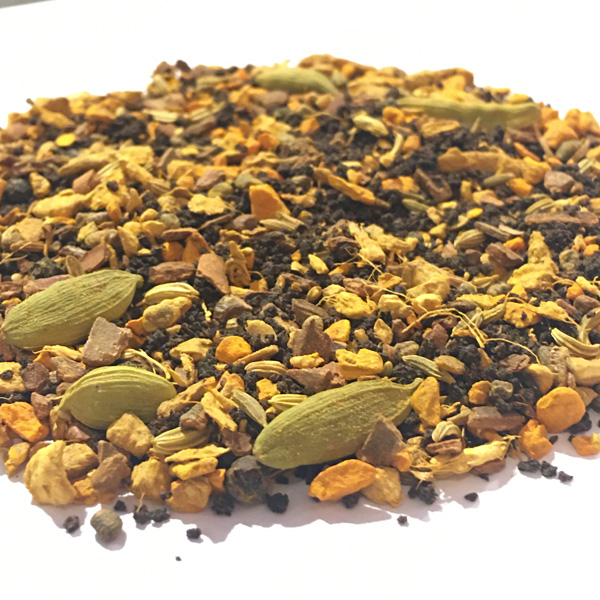
This chai is no shrinking violet! With ginger, cinnamon, turmeric, clove, cardamom, fennel, black pepper and cayenne, it’s probably our most flavor-intense chai, and that’s saying something: Our chais amount to a parade of flavor bombs.
The adaptogenic component of Sunrise Chai, turmeric, represents another botanical with which people are widely familiar — the rhizome became quite the trendy botanical in the 2010s —but often don’t realize is also an adaptogen. With turmeric, the compound curcumin serves as the adaptogen. Among other things, it may help reduce cortisol and inflammation.
Turmeric is one powerful plant. Its rise in popular culture revolved — and continues to revolve — around its abilities to mitigate inflammation. Many medical researchers and experts point toward inflammation as a primary culprit for many human ills; anything that helps massage away inflammation offers at least some health benefits.
In addition to its wellness advantages, we delight in turmeric’s strong, woody, earthy flavor. It’s exceptionally warming. You will thrill to this outstanding chai.
Exploring Adaptogens in 2024:
Adaptogens continue to gain popularity for their ability to support the body’s response to stress and enhance vitality. From ashwagandha to rhodiola, these botanical wonders offer a myriad of health benefits. As interest in holistic health practices grows, adaptogens have become readily available in various forms, including powders, tinctures, and capsules.
Tea as a Wellness Ritual:
Tea has long been cherished for its soothing properties and diverse flavors. In 2024, tea enthusiasts have access to an unprecedented array of high-quality teas sourced from around the globe. Whether you prefer the subtle sweetness of green tea or the robustness of black tea, there’s a blend to suit every taste preference.
The Perfect Pairing:
When adaptogens are infused into tea, they create a synergistic blend that amplifies both the flavor and the health benefits of the beverage. For instance, combining ashwagandha with a floral white tea can promote relaxation and stress relief, while blending rhodiola with energizing yerba mate can provide a sustained boost of energy without the jitters.
Benefits of Adaptogen-Infused Tea:
- Stress Relief: Adaptogens help regulate the body’s stress response, promoting a sense of calm and relaxation. When paired with tea, they offer a soothing antidote to the demands of modern life.
- Enhanced Energy: Unlike caffeine, adaptogens support sustainable energy levels without causing crashes or jitters. By nourishing the adrenal glands and balancing neurotransmitter function, they provide a gentle yet revitalizing boost.
- Immune Support: Many adaptogens possess immune-modulating properties that help fortify the body’s defenses against illness and infection. Incorporating them into your tea routine can help support overall immune health.
Dosage and Safety Information:
When incorporating adaptogens into your tea regimen, it’s essential to start with low doses and gradually increase as needed. Recommended dosages can vary depending on the specific adaptogen and individual factors such as age, weight, and health status. Consultation with a healthcare professional is recommended, especially if you have underlying health conditions or are taking medication.
Common Dosages for Adaptogens in Tea:
- Ashwagandha: 250-500mg per day
- Rhodiola: 200-600mg per day
- Holy Basil: 300-600mg per day
- Reishi Mushroom: 1-2g per day
Potential Side Effects and Contraindications:
While adaptogens are generally considered safe for most people, they may cause side effects in some individuals, especially at higher doses. Common side effects may include digestive upset, headaches, or allergic reactions. It’s essential to monitor your body’s response and adjust dosage accordingly.
Incorporating Adaptogens Into Your Tea:
To maximize the benefits of adaptogen-infused tea, follow these tips:
- Use high-quality loose-leaf tea and adaptogen powders from reputable sources.
- Experiment with different combinations to find flavors that appeal to you.
- Follow recommended steeping times and temperatures for optimal flavor and potency.
- Start with small amounts of adaptogens and gradually increase as needed.
- Keep track of your dosage and any changes in how you feel.
Adaptogenic Tea Blends: Elevating Health and Flavor:
- Beauty Tea (Tulsi):
- This delightful blend incorporates two adaptogens, tulsi (Holy Basil) and licorice root, aiming to promote hair, skin, and nail health.
- Tulsi, also known as Holy Basil, is revered in Ayurvedic medicine for its multitude of health benefits, including combating infections and improving skin health.
- Licorice root, another adaptogen in the blend, aids in digestion and helps alleviate symptoms of stress.
- Additional ingredients like nettle, rose hip, and orange add to the flavor profile and provide extra wellness benefits.
- Immortal Tea (Ginseng and Jiaogulan):
- This potent blend features two adaptogens, ginseng and jiaogulan, renowned for their stimulating properties.
- Jiaogulan, also known as the “Immortality herb,” offers stimulating properties and is complemented by the OG adaptogen, ginseng.
- Ginseng’s rich flavor and stimulating effects are balanced, offering a sense of energy and balance without causing racing thoughts.
- While ginseng and jiaogulan provide energy, consuming them close to bedtime might affect sleep due to their stimulating properties.
- Sunrise Chai (Turmeric):
- This turmeric-heavy chai is bursting with flavor and adaptogenic excellence.
- Turmeric, known for its anti-inflammatory properties, also acts as an adaptogen, helping to reduce cortisol levels and inflammation in the body.
- Beyond its wellness benefits, turmeric adds a warm, woody, earthy flavor to the chai, making it a delightful and healthful beverage choice.
- With a blend of ginger, cinnamon, clove, cardamom, and other spices, Sunrise Chai offers an intense flavor experience that will invigorate your senses.
Join the journey to enhanced well-being by incorporating adaptogens into your daily tea ritual. Discover the harmonious blend of soothing tea and powerful adaptogens that nourishes both body and soul at Kucha Tea. Whether you crave stress relief, sustained energy, or immune support, adaptogen-infused tea provides a natural and effective solution in 2024 and beyond. Cheers to embracing a healthier, more vibrant you!

